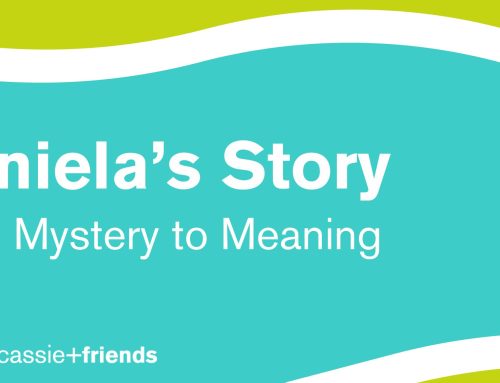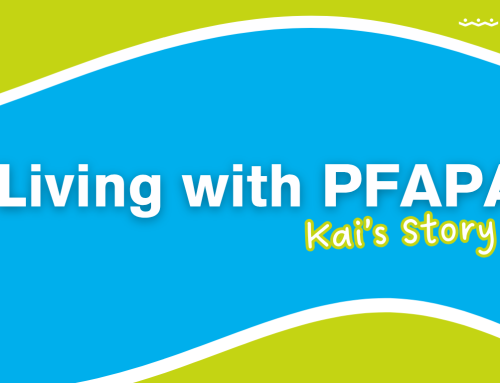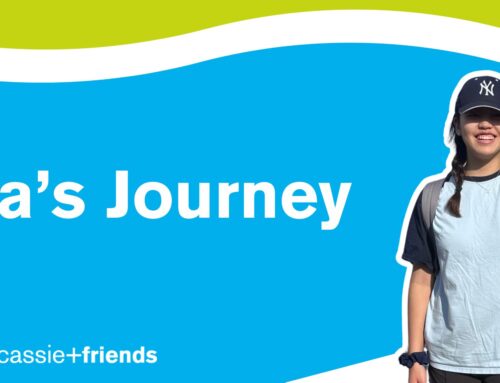A Guide to Accommodations
Acceptance, Peer Pressure, and Fear
We’re honoured to share this piece by Kayla Caddy, a young adult living with Juvenile Idiopathic Arthritis (JIA) who works as a job coach for people on the autism spectrum. Drawing on her lived experience and professional expertise, Kayla shares with us some tips for accepting and advocating for accommodations, whether at school, work, or in your daily life. Check out her advice below!
When you hear the word “accommodations” what comes to mind? Oftentimes, people think of accommodations as expensive, a hassle, an unfair advantage, or a last resort. However, “accommodations” is just a fancy word for something that will help you do a given task to the best of your ability. Accommodations come in all shapes and sizes- expensive or cost-free, visible or invisible, formal or informal, temporary or permanent. Accommodations are used to help people with disabilities participate in their work or school tasks to the same level as their peers, and to create a more equitable environment where people’s individual circumstances are taken into account. I like to split accommodations into two categories: self-accommodations, and requested accommodations. Self-accommodations are adjustments that you can make yourself, without necessarily needing to disclose your disability. They are often simple, quick, and cheap, such as wearing a wrist brace you already have, bringing your lunch in containers that you can easily open, or writing a to-do list when your brain fog is bad. Requested accommodations are more formal, and something that you will have to discuss with your employer or school (you can find more information on the Canadian Human Rights Commission website). These types of accommodations vary greatly, such as providing you with an ergonomic workstation, adjusting your hours of work, or allowing you more frequent breaks.
As someone with multiple chronic illnesses, I have had to accept the fact that I need accommodations. This can be a hard fact to digest, especially for young people with invisible illnesses such as JIA. One thing that has helped me come to terms with needing accommodations was doing so in spaces that felt more comfortable first – such as with friends or family members. When I was able to see the impact that these small accommodations had, I became more comfortable with the fact that there were other things that could help me too. Throughout the years, my accommodation needs have looked different. In high school I had accommodations for what type of physical activity I had to do in gym class. In University I received extra time to write exams and assistance with taking notes. With friends, I ask to do activities that are more sedentary. At work, I request to work from home when my fatigue is bad and use an ergonomic mouse to help my wrist pain. Since JIA can cause my symptoms to fluctuate frequently, the accommodations that I require change as my symptoms do.
Over the past two years, I have worked as a job coach for people on the autism spectrum. An important part of my role is to help my clients figure out what accommodations they may need, how to implement them, and ensure they understand the legal duty of employers and schools to accommodate them. However, the topics that come up most frequently are different variations of “How do I come to terms with needing accommodations?” and “What if a coworker/peer views my accommodations as unfair?”. These are big stressors for many people who are considering requesting accommodations, and it can, unfortunately, cause people to not seek the support they need due to fear of being questioned, seeming different, or being judged (or even judging themselves).
JIA is a primarily invisible disability, meaning that most people won’t be able to see that you have JIA just by looking at you. This can make it even more difficult to come to terms with requesting accommodations, as it often means that someone suddenly knows about and can “see” your struggles. Unfortunately, others may not understand why you need accommodations if they can’t see your disability. They may ask questions about why you need them, or may even make remarks about your accommodations being unfair. This is why it’s important to learn to advocate for yourself. Self-advocacy is a skill that everyone should have, especially those with disabilities or chronic illnesses. It can be helpful to come up with a short list of self-advocacy statements to use in case you end up being questioned about your accommodations. Here are some examples:
“I have a chronic illness that makes it hard for me to stand for long periods, so I am allowed to use this stool as an accommodation.”
“This is an accommodation that I have set up with our manager/teacher/supervisor.”
“I have a disability that makes the joints in my hands hurt and tire quickly. Can we please talk about what accommodations may be available to me?”
“This accommodation doesn’t put me at an unfair advantage. Without it, I wouldn’t be able to do my work as easily. It helps me do my job while being in less pain/less tired.”
Overall, it is important to remember that using accommodations does not make you lazy or give you an unfair advantage. It means that you’re a strong self-advocate who is trying to look out for their wellbeing. If you think you might need an accommodation, chances are you do. I challenge you to take the leap and try it out – start small if you need to in a place that you feel safest. Start advocating for smaller things, and work your way up so you can become more comfortable. You deserve to be accommodated and you deserve to be listened to when you advocate for what you need.










Leave A Comment